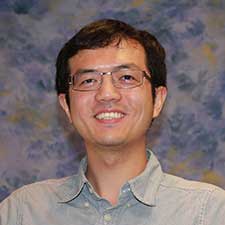Research Interests
The multi-disciplinary research programs in the Fang Group will focus on the bottom-up synthesis and processing of novel organic polymer materials — namely, ladder and coplanar polymers, as well as microporous polymer networks — for the applications on electronics and energy conversion/storage. Our thrust will be to gain profound understanding on the structure-property relationship of these materials at both the molecular and the macroscopic levels by employing the toolboxes of synthetic chemistry and device engineering. With this knowledge, we aim to establish a series of synthetically feasible, high performing, processable organic carbon-based material systems for field effect transistors, light emitting diodes, solar cells, supercapacitors, and batteries, and to be at the forefront in the enhancement of their efficiencies.
Milestones for these projects are identified as:
- Feasible bottom-up synthesis and unambiguous characterization of covalently bridged ladder polymers, noncovalently coplanarized polymers, and cross-linked microporous polymer networks/covalent organic frameworks.
- Successful processing of these materials into application-related forms.
- Fabrication and test of the functional devices.
In order to achieve these benchmarks, the following strategies will be employed:
- Utilizing synthetic versatility of the core structures of the polymers to meet the specific requirements and to avoid potential synthetic challenges.
- Engineering the sidechains to address the challenges regarding solubility, characterization and processing.
- Incorporating techniques such as (a) in situ processing, (b) post-casting reaction and (c) grafting from the substrate, to process these materials and to fabricate the devices.
Graduate students joining the Fang Group will receive an extensive training across the broad range of contemporary organic, polymer and physical chemistry, materials science and process engineering, on the basis of chemical synthesis. The students are also expected to work and study in a highly collaborative environment, yet to gain a profound understanding in the research area he/she focuses on.
The Fang Group will be equipped with standard synthetic organic/polymer chemistry facilities, including fume hoods, rotary evaporators, dry solvent systems, glove boxes and analytical / preparative GPC systems. In addition, we will obtain instrumentations for thin-film engineering and device characterization, such as spin-coater, vacuum deposition chamber, probe station, and semiconductor characterization system.
Educational Background
- B. S., Wuhan University
- Ph. D., Northwestern University
Selected Publications
Zhu, C.; Ji, X.; You, D.; Chen, T. L.; Mu, A. U.; Baker, K. P.; Klivansky, L. M.; Liu, Y.; Fang, L.* Extraordinary Redox Activities in Ladder-Type Conjugated Molecules Enabled by B←N Coordination-Promoted Delocalization and Hyperconjugation. J. Am. Chem. Soc. 2018, 140, 18173–18182.
Lee, J.; Li, H.-B.; Kalin, A. J.; Wang, C.; Yuan, T.; Li, H.-Y.; Fang, L.* Extended Ladder-Type Benzo[k]tetraphene-Derived Oligomers, Angew. Chem. Int. Ed., 2017, 56, 13727–13731.
Lee, J.; Kalin, A. J.; Yuan, T.; Al-Hashimi, M.; Fang, L.* Fully Conjugated Ladder Polymers, Chem. Sci. 2017, 8, 2503−2521. (Invited Perspective, Front Cover highlight)
Zou, Y.; Ji, X.; Yuan, T.; Stanton, D. J.§; Cai, J.; Lin, Y.-H.; Naraghi, M.; Fang, L.* Synthesis and Solution Processing of Hydrogen-Bonded Ladder Polymer, Chem, 2017, 2, 139−152. (The article and the first author are highlighted in a "Potential Energy" essay in the same issue)
Lee, J.; Rajeeva, B. B.; Yuan, T. Y.; Guo, Z.-H.; Al-Hashimi, M.; Zheng, Y. B.; Fang, L.* Thermodynamic Synthesis of Solution Processable Ladder Polymers, Chem. Sci. 2016, 7, 881−889. (Front Cover Highlight).

